

The Gallup Q12 survey questions. What Makes Gallup’s Q12 Survey the Best Way to Measure Employee Engagement? Book Summary - Follow This Path. Research behind the Gallup Q12. Bibliographic record and links to related information available from the Library of Congress catalog Information from electronic data provided by the publisher.

Driving Performance & Retention through Employee Engagement. Influences on Job Performance. 10 percent of people look forward to going to work every day. Sign up for the Yes, I accept Terms of Use.
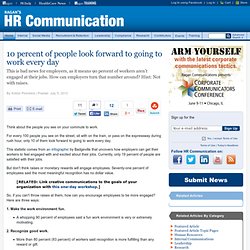
Follow HR Communication on: This is bad news for employers, as it means 90 percent of workers aren't engaged at their jobs. Employee Engagement - Key to Realizing Competitive Advantage. To Give Your Employees Meaning, Start With Mission - Teresa Amabile and Steve Kramer. By Teresa Amabile and Steve Kramer | 11:00 AM December 19, 2012 It is impossible to have a great life unless it is a meaningful life.
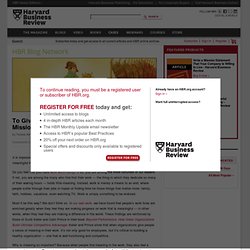
And it is very difficult to have a meaningful life without meaningful work. -Jim Collins Do you feel that you have work worth doing? How To Develop a Long-Term Employee Engagement Solution. Increasing employee engagement is a priority for most companies.
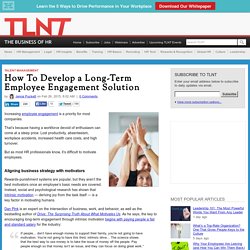
That’s because having a workforce devoid of enthusiasm can come at a steep price: Lost productivity, absenteeism, workplace accidents, increased health care costs, and high turnover. But as most HR professionals know, it’s difficult to motivate employees. Aligning business strategy with motivators Rewards-punishment systems are popular, but they aren’t the best motivators once an employee’s basic needs are covered. Instead, social and psychological research has shown that intrinsic motivation — deriving joy from the task itself — is a key factor in motivating humans. On Creating a Powerful Organization. What scientists call distributed control is usually called empowerment by management consultants.
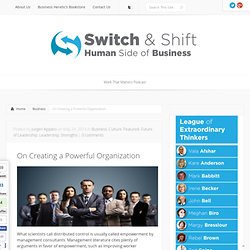
Management literature cites plenty of arguments in favor of empowerment, such as improving worker satisfaction, increasing profitability, and strengthening competitiveness. [Bowen and Lawler, “Empowering Service Employees”] All of these are true, but never forget that the real reason for empowerment is to improve system effectiveness and survival.
We enable the organization to have more resilience and agility by delegating decision-making and distributing control. Empowerment Means: A More Powerful Organization Unfortunately, empowerment sounds easier than it is. Employee Engagement - Today and Tomorrow. Employee Engagement Does More than Boost Productivity - John Baldoni. By John Baldoni | 8:00 AM July 4, 2013 Improving employee engagement is not simply about improving productivity — although organizations with a high level of engagement do report 22% higher productivity, according to a new meta-analysis of 1.4 million employees conducted by the Gallup Organization.
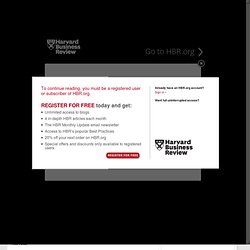
In addition, strong employee engagement promotes a variety of outcomes that are good for employees and customers. For instance, highly engaged organizations have double the rate of success of lower engaged organizations. Comparing top-quartile companies to bottom-quartile companies, the engagement factor becomes very noticeable. Making Your Employees Happy Could Save You Millions. Here’s Why. Life is too short not to be happy.
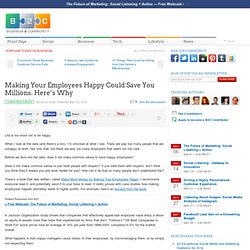
40 Organizations Leading the World in Employee Engagement. What High Performers Want at Work. A high performer can deliver 400% more productivity than the average performer.

Despite this, when most managers look at workforce statistics, all employees tend to be lumped together into a category so broadly defined that it becomes difficult to take meaningful decisions. If your average employee tenure is six years, is that good or bad? You could benchmark the Fortune 500 and find that indeed you would look pretty good, tied at 40th place. But if the people you are keeping are the low performers and your high performers are leaving, would that be really so great? Last summer, my colleagues and I at SAP conducted a study with Oxford Economics across 27 countries to find out what the future workforce wants. As you would expect, high performers as compared to low performers are more satisfied with their jobs and less likely to leave their jobs in the next six months.
Top 10 questions for employee engagement surveys. Employee surveys may range from annual "epics" to monthly pulse surveys, but there is no one-size-fits-all version.
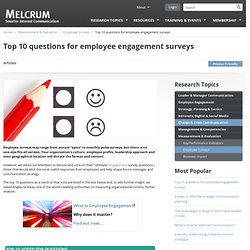
Your organization's culture, employee profile, leadership approach and even geographical location will dictate the format and content. However, we asked our Members to discuss and vote on their "ultimate" engagement survey questions – those that would elicit the most useful responses from employees and help shape future messages and communication strategy. The top 10 questions as a result of that vote are listed in the box below and, to add further insight, we asked Angela Sinickas, one of the world's leading authorities on measuring organizational comms, for her analysis. Questions to ask in focus groups first. Cycle of Job Hate. Inspiring Motivational Video: Cross the Line® What motivates us at work? 7 fascinating studies that give insights. “When we think about how people work, the naïve intuition we have is that people are like rats in a maze,” says behavioral economist Dan Ariely in today’s talk, given at TEDxRiodelaPlata.
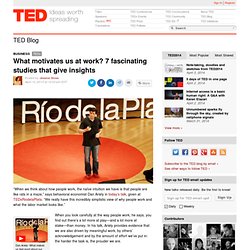
“We really have this incredibly simplistic view of why people work and what the labor market looks like.” Dan Ariely: What makes us feel good about our work? When you look carefully at the way people work, he says, you find out there’s a lot more at play—and a lot more at stake—than money. In his talk, Ariely provides evidence that we are also driven by meaningful work, by others’ acknowledgement and by the amount of effort we’ve put in: the harder the task is, the prouder we are.
During the Industrial Revolution, Ariely points out, Adam Smith’s efficiency-oriented, assembly-line approach made sense. Every Worker Should Be C.E.O. of Something. Q. What are the most important leadership lessons you’ve learned? A. If I was going all the way back, it would be playing on my school’s soccer team, because we were on the same team together, most of us for eight or nine years, and we were at a really little school in Chicago that had no chance of really fielding any great athletes.
But we ended up doing really well as a team, and we made it to the state quarterfinals, and it was all because of teamwork. 7 Ways to Lead With Your Heart. How to Motivate Your Managers. Viktor Frankl on the Human Search for Meaning. By Maria Popova “Live as if you were living already for the second time and as if you had acted the first time as wrongly as you are about to act now!” Celebrated Austrian psychiatrist and Holocaust survivor Viktor Frankl, born on March 26, 1905, remains best-known for his indispensable 1946 psychological memoir Man’s Search for Meaning (public library) — a meditation on what the gruesome experience of Auschwitz taught him about the primary purpose of life: the quest for meaning, which sustained those who survived.
How to Get People to Do Stuff. Daniel Goleman on how to motivate a demotivated person. How to Manage a Perfectionist - Amy Gallo - Best Practices. By Amy Gallo | 12:13 PM October 19, 2011 Do you have a perfectionist on your team? The good news is that your direct report has high standards and a fine attention for detail. The bad news is that he fixates on every facet of a project and can’t set priorities. How to Deal with Chronic Complainers. How to Motivate People: 4 Steps Backed by Science. Employees, spouses, kids — what does it take to get people motivated so you don’t have to nag them? Motivation is powerful. It predicts success better than intelligence, ability, or salary. Via The 100 Simple Secrets of Successful People: When tested in national surveys against such seemingly crucial factors as intelligence, ability, and salary, level of motivation proves to be a more significant component in predicting career success.
While level of motivation is highly correlated with success, importantly, the source of motivation varies greatly among individuals and is unrelated to success. – Bashaw and Grant 1994. Three Things that Actually Motivate Employees - Rosabeth Moss Kanter. By Rosabeth Moss Kanter | 10:00 AM October 23, 2013 The most motivated and productive people I’ve seen recently work in an older company on the American East Coast deploying innovative technology products to transform a traditional industry. To a person, they look astonished when I ask whether their dedication comes from anticipation of the money they could make in the event of an IPO.
Newcomers and veterans alike say they are working harder than ever before. How to Motivate Employees: 10 Things They Really Need to Hear From You. How to keep employees motivated. How to Always Remember People's Names. 6 Things Really Thoughtful Leaders Do. 8 Surefire Ways to Demotivate Your Employees. Why Top Talent Leaves: Top 10 Reasons Boiled Down to 1. Robert Senior on Inspire your people for great ideation… Robert Senior is CEO of Saatchi & Saatchi, Europe Middle East and Africa and the... Robert Senior is CEO of Saatchi & Saatchi, Europe Middle East and Africa and the Saatchi & Saatchi Fallon Group (SSF)*. Senior joined Saatchi & Saatchi in 2007 as UK CEO of SSF and was appointed Chairman of the Worldwide Creative Board in 2010. Senior founded Fallon London in 1998 with four other partners. Simon Sinek: How great leaders inspire action. Best Motivation Video Ever.
Dan Pink on the surprising science of motivation.